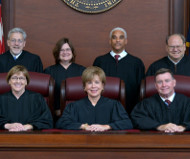Article from: www.thenewspaper.com/news/47/4762.asp
8/6/2015
Missouri Supreme Court Backs Anti-Speed Trap Law
Missouri legislature saves anti-speed trap law from the legal challenge mounted by small towns.
 The Missouri Supreme Court on Tuesday shot down a challenge to the Macks Creek Law, a statute put in place to discourage small town speed traps. The law states that no municipality may earn more than thirty percent of its annual revenue from ticketing. Cities that exceed the cap must return the excess cash to the state government so it can be used in school programs.
The Missouri Supreme Court on Tuesday shot down a challenge to the Macks Creek Law, a statute put in place to discourage small town speed traps. The law states that no municipality may earn more than thirty percent of its annual revenue from ticketing. Cities that exceed the cap must return the excess cash to the state government so it can be used in school programs.
This arrangement outraged the Missouri Municipal League, which argued that small towns should be allowed to generate as much revenue as they desire by pulling over drivers who were just passing through on an interstate highway. Realizing the nature of the legal challenge, the General Assembly re-wrote the law so that it would stand up in court -- and it did.
"In addition to enacting various new sections, Senate Bill 5 repeals the language in section 302.341.2 that formed the basis for Missouri Municipal League's claims," Judge Paul C. Wilson wrote for the unanimous court. "Accordingly, MML's claims are moot, and this appeal is dismissed."
Governor Jay Nixon (D) signed Senate Bill 5 into law last month. This deleted the section of the Macks Creek Law that stripped speed trap towns of their authority to run municipal courts -- a provision that raised serious legal questions. The newly revised Macks Creek Law cracks down on local corruption by creating minimum standards for the operation of municipal court, including an annual financial audit, placement of all municipal codes online and requiring accreditation for police officers. The state supreme court must also set up rules to prevent a conflict of interest between the mayor, the local prosecutor and the municipal court.
Residents can complain to the attorney general if their municipality fails to follow the minimum standards. The attorney general must investigate the allegations and can file suit in circuit court to enforce the standards. The circuit court judge's ultimate weapon is the power to dissolve the town or to put the question of disincorporation on the ballot.
Given the change to the statute, the supreme court justices reasoned that even if they agreed with the municipalities that the original anti-speed trap was flawed because it affected the jurisdiction of municipal courts, it would accomplish nothing to say that in a ruling since the offending provision no longer exists.
"As a result of Senate Bill 5, therefore, there simply is nothing left of MML's substantive constitutional claims for this court to decide," Judge Wilson wrote. "Whatever else may be said about SB5, there can be no doubt that it alters the landscape of the Macks Creek Law to such an extent that there is no longer any reason to analyze MML's claims and no longer any way to fashion meaningful relief for those claims if they were to prevail. If MML wishes to challenge the provisions of SB5, it must initiate a new suit and assert those claims in a new petition"
Better Together St. Louis, a local activist group, argued in a report that the Macks Creek law does not go far enough to stop the abuse of law enforcement for revenue generation (view report). A copy of the latest ruling is available in a PDF file at the source link below.
Source: Missouri Municipal League v. Missouri (Missouri Supreme Court, 8/5/2015)
Permanent Link for this item
Return to Front Page
 The Missouri Supreme Court on Tuesday shot down a challenge to the Macks Creek Law, a statute put in place to discourage small town speed traps. The law states that no municipality may earn more than thirty percent of its annual revenue from ticketing. Cities that exceed the cap must return the excess cash to the state government so it can be used in school programs.
The Missouri Supreme Court on Tuesday shot down a challenge to the Macks Creek Law, a statute put in place to discourage small town speed traps. The law states that no municipality may earn more than thirty percent of its annual revenue from ticketing. Cities that exceed the cap must return the excess cash to the state government so it can be used in school programs.